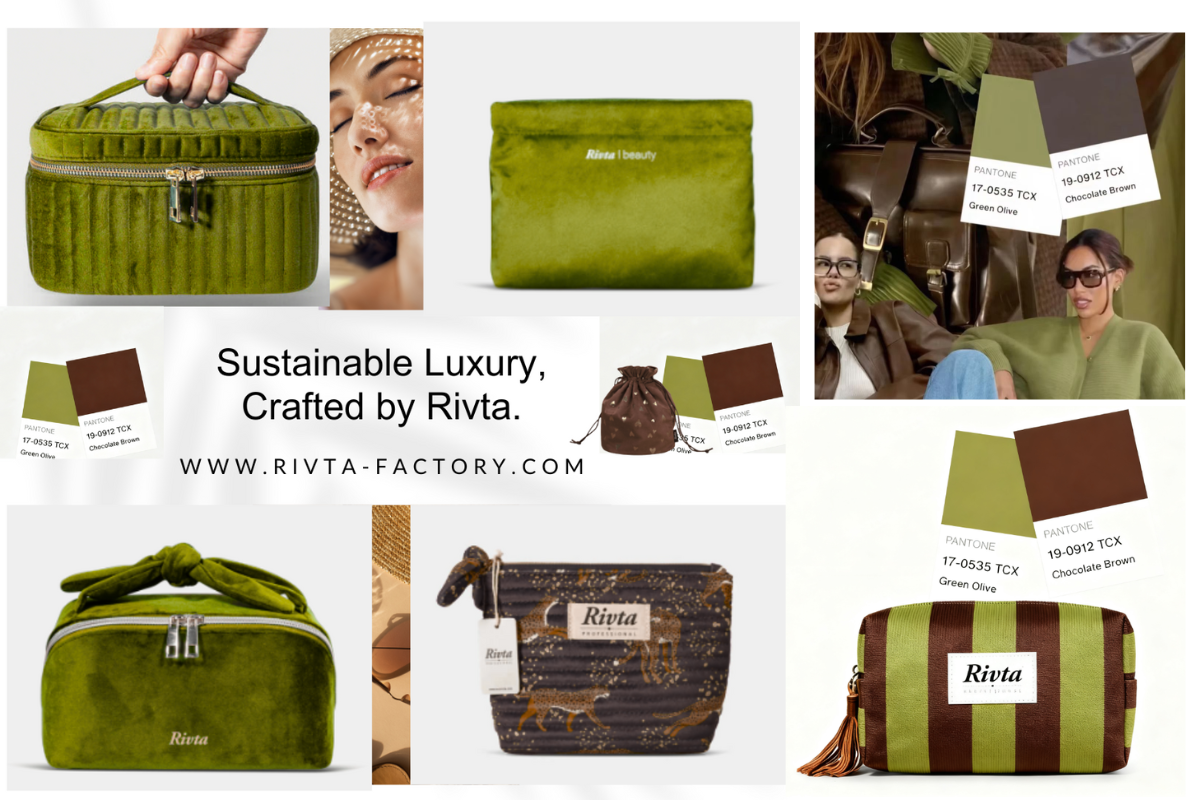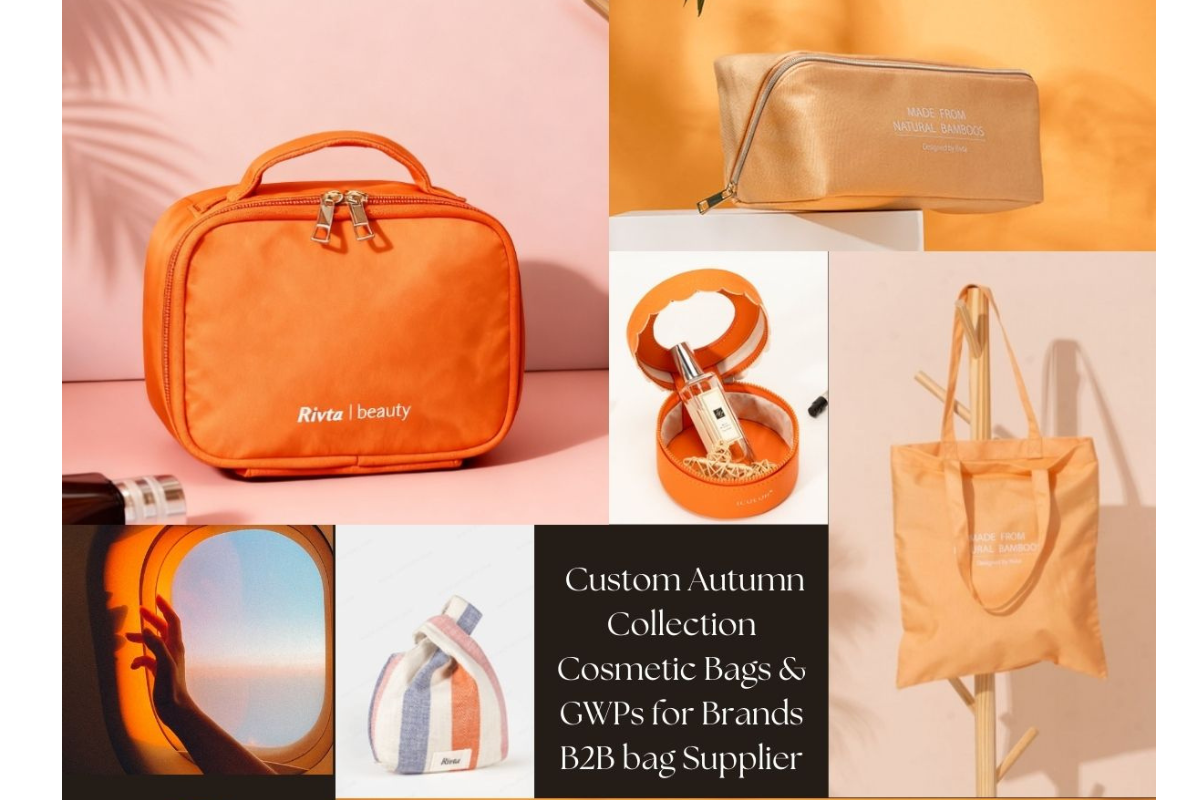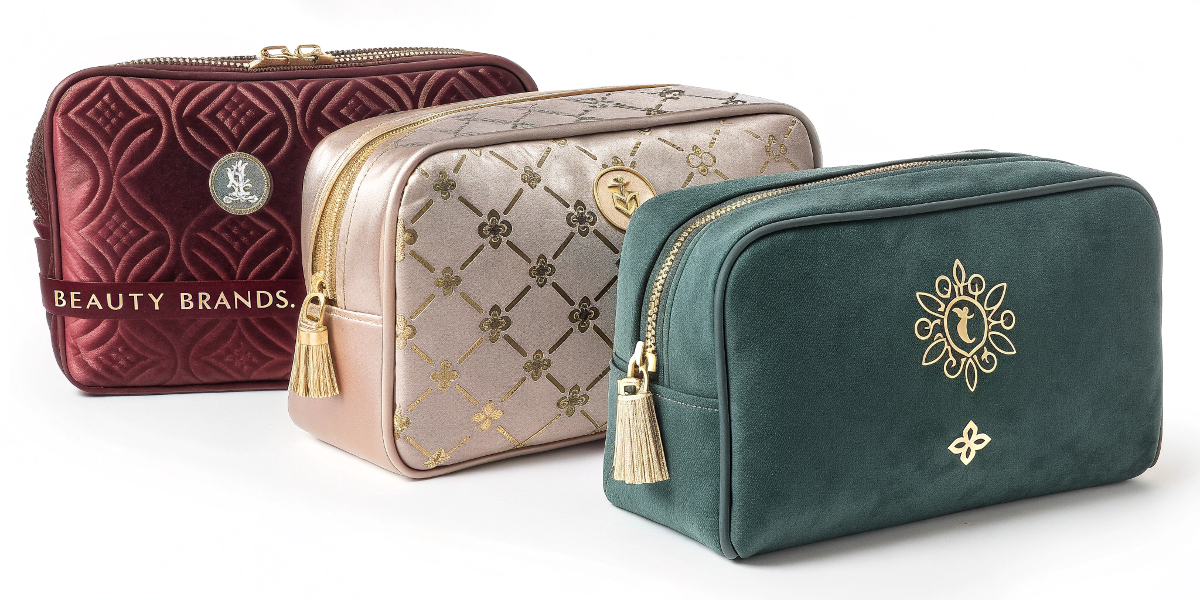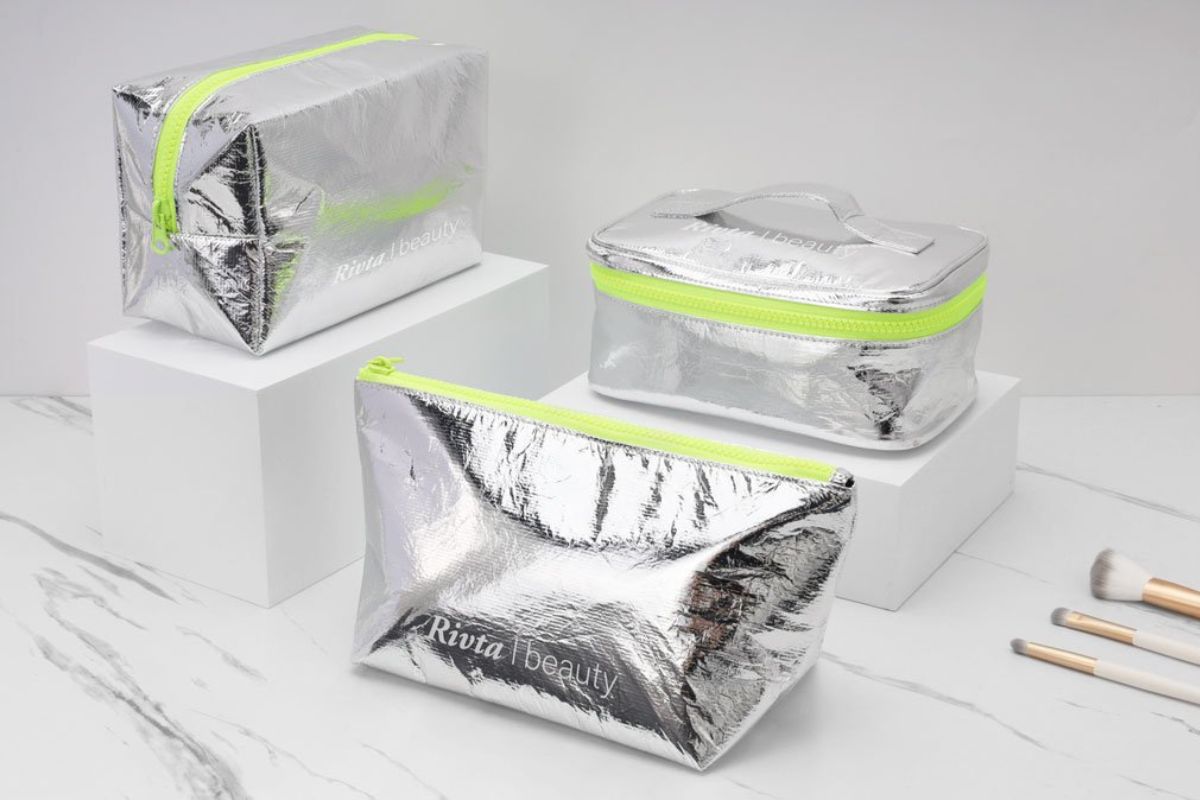Guilt-Free Glamour: Why Luxury Beauty Brands Are Turning to Vegan Leather for Exclusive Gifting
As the definition of luxury evolves, leading beauty brands are elevating indulgence by embedding ethical integrity and sustainability into their core value propositions. Nowhere is this transformation more evident than in the realm of exclusive gifting, where material choices reflect not just aesthetics, but corporate responsibility and long-term brand vision. Vegan leather—a sophisticated, cruelty-free alternative—is rapidly gaining favor. It delivers the rich texture and visual allure of traditional leather while supporting a new era of conscious luxury.
At Rivta, a trusted manufacturer of high-quality, eco-conscious cosmetic bags since the 1990s, we've had a front-row seat to this evolution. We've seen luxury shift from status-driven consumption to a celebration of craftsmanship, sustainability, and thoughtful design. This article explores the rise of vegan leather in the premium beauty gifting space—covering material innovations, regulatory trends, and the strategic advantages for brands seeking to enhance both ESG performance and customer loyalty.
The Shifting Definition of Luxury
The beauty industry has long grappled with the ethical implications of its supply chains with the movement towards cruelty-free products gaining significant momentum over the past decade. What began as a focus on animal testing has expanded into a broader ethical imperative, encompassing the entire lifecycle of a product, from its ingredients to its packaging and the accessories that accompany it. Today, a truly conscientious brand extends its commitment to animal welfare beyond just the formulations within its bottles; it scrutinizes every component, including the materials used for its premium packaging and gifting items.
Once defined by opulence and exclusivity, luxury is now increasingly measured by authenticity, purpose, and positive impact. Now discerning buyers—especially procurement leads at major retailers and corporate gifting departments—are no longer content with aesthetics alone. They seek products that align with values such as environmental stewardship, animal welfare, and ethical production.
This shift is not a passing trend; it's a market redefinition. As social consciousness becomes a core purchasing driver, brands must respond with offerings that speak to both heart and mind. For luxury beauty brands, this means ensuring that every element of the product—right down to the packaging—conveys integrity and purpose.
Luxury is also being reinterpreted by younger, values-driven demographics. Millennials and Gen Z consumers—projected to represent over 60% of the luxury market by 2026—demand purpose as much as polish. A 2023 study by Bain & Company found that 78% of Gen Z luxury consumers consider sustainability a key factor in purchasing decisions. In this landscape, brands must shift from aspirational image-making to authentic value creation.

Conscious Consumers, Conscious Choices
Today's consumers, especially those with high purchasing power, are more informed and value-driven than ever. They expect brands to go beyond quality, demanding transparency about sourcing, labor practices, and environmental impact. Nowhere is this expectation more critical than in the context of gifting—where a product represents not just the giver, but also the values of the brand behind it.
A well-crafted, ethically produced cosmetic bag made from vegan leather speaks volumes. According to recent research, 95% of shoppers are actively seeking vegan-certified options, indicating strong commercial demand. Choosing materials like vegan leather signals a brand's alignment with modern values—creating lasting emotional resonance with both end users and B2B buyers.
In this environment, cosmetic bags used as VIP gifts or seasonal giveaways must carry more than the brand logo—they must carry meaning. Buyers at luxury retailers and corporate gift specialists increasingly use material credentials as a filter during procurement, seeking options that both reflect client expectations and enhance their own organizational values.
Transparency is now a strategic imperative. Consumers are asking: Where did this product come from? Who made it? What's its environmental footprint? A vegan leather pouch with clear sustainability credentials offers straightforward answers—empowering brands to engage meaningfully across marketing, sales, and sustainability channels.
The Broader Rise of Veganism
Once confined to dietary choices, the vegan lifestyle has permeated fashion, beauty, and design. Today, 'cruelty-free' is more than a label—it's a brand differentiator. As this ethos spreads, consumer expectations are evolving across industries. The global vegan leather market is projected to reach $90 billion by 2025, outpacing traditional leather in growth and market relevance.
This movement is not just about eliminating animal products. It represents a holistic shift toward materials that consider environmental footprint, human health, and product lifecycle. For brands, embracing vegan leather is both a response to market pressure and an opportunity to lead.
We are seeing more than just a moral alignment. Veganism is influencing material sourcing, brand messaging, and even investment decisions. Companies with clearly communicated vegan offerings are outperforming peers in consumer trust and investor interest. In the luxury space, where image and integrity are intertwined, these shifts carry significant weight.
Retailers such as Selfridges and Nordstrom have introduced dedicated vegan sections or ethical gifting guides. Influential platforms like The Good Trade and Fashion Revolution are shaping buyer expectations by highlighting brands that demonstrate cruelty-free innovation. Within this context, using vegan leather becomes a strategic differentiator.
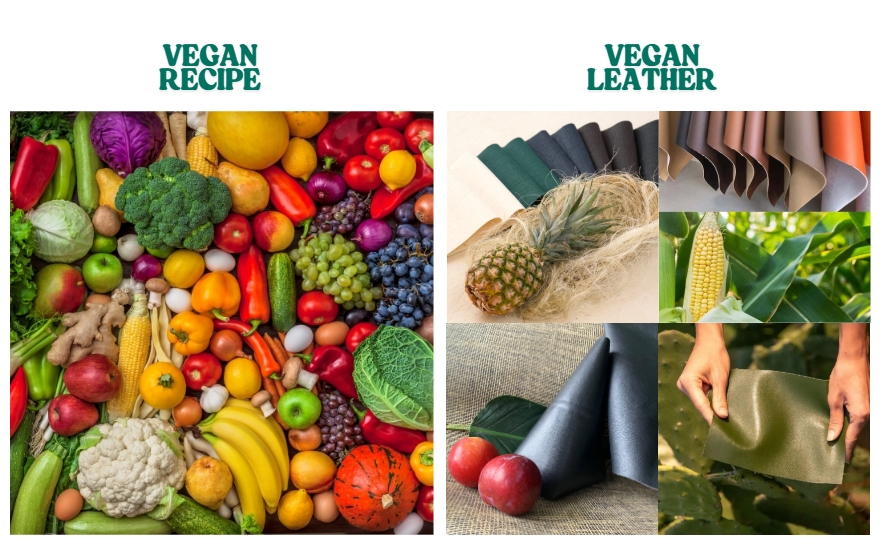
Material Innovation: Vegan Leather Redefined
For many years, the term "vegan leather" was almost synonymous with polyurethane (PU) or polyvinyl chloride (PVC), synthetic materials that, while animal-free, often raised concerns about their environmental impact due to their petroleum-based origins and non-biodegradable nature. While these materials offered a cruelty-free alternative to traditional leather, their production processes and end-of-life implications presented a different set of challenges for brands committed to comprehensive sustainability. However, the landscape of vegan leather has undergone a remarkable transformation, driven by relentless innovation and a growing demand for truly eco-conscious materials.
The conversation around vegan leather has matured beyond mere substitution. These next-generation materials are not simply "faux"—they're a leap forward in innovation, combining performance, design flexibility, and sustainability.
Modern vegan leathers are developed from a wide range of natural and renewable resources, including:
| Material | Source | Key Characteristics | Sustainability Benefits |
|---|---|---|---|
| Pineapple Leather | Cellulose fibers from pineapple leaves (agricultural byproduct) | Durable, breathable, flexible | Upcycles waste, reduces chemical use |
| Cactus Leather | Nopal cactus | Soft, water-resistant, long-lasting | Low water use, pesticide-free |
| Apple Leather | Apple pomace (fruit industry waste) | Smooth, soft, often blended with PU | Reduces landfill, repurposes food waste |
| Corn Leather | Corn polyols | Durable, suitable for structured bags | Renewable base, petroleum reduction |
These advancements are not just about finding alternatives; they are about redefining material science. Researchers and manufacturers are continuously refining the production processes, enhancing the quality, performance, and aesthetic versatility of these bio-based leathers. The focus is on creating materials that not only meet the stringent demands of luxury brands for durability, texture, and finish but also contribute positively to a circular economy. This commitment to innovation ensures that luxury beauty brands can now choose vegan leather options that truly embody their values, offering products that are both exquisitely crafted and environmentally sound.
At Rivta, we continuously invest in sourcing and testing these materials, ensuring that our clients have access to the most advanced, sustainable options for their gifting strategies. Whether it's a sleek cactus leather pouch or a structured apple leather vanity case, we help brands bring their ethical vision to life through functional, premium design.
In many cases, these vegan leathers also allow for greater design flexibility. Brands can achieve vibrant color treatments, embossed logos, and unique surface textures not easily possible with traditional animal hides. This opens up creative possibilities for limited-edition gifting that stands out visually and ethically.
Environmental Impact: A Strategic Advantage
Compared to traditional leather, which involves resource-intensive animal farming and chemical-heavy tanning processes, plant-based leathers require significantly less water, land, and energy. Many are biodegradable or made from upcycled agricultural waste—minimizing environmental harm while supporting circular economy principles.
Luxury brands are increasingly being evaluated on ESG performance. As scrutiny over carbon footprint, water usage, and chemical waste grows, vegan leather offers a compelling solution.
Choosing vegan leather for gifting allows beauty brands to showcase their commitment to sustainability in a tangible, elegant way. It's more than a responsible choice—it's a statement of leadership in a future-facing industry.
Luxury as a Tool for ESG Alignment
From carbon-neutral goals to biodiversity preservation, environmental performance is now central to how luxury brands are perceived by stakeholders. Vegan leather aligns with these goals in several ways:
- Reduced reliance on livestock agriculture, a major driver of deforestation and methane emissions
- Lower water consumption and chemical usage in production
- Easier biodegradability and support for circular economies
By making environmentally sound choices in auxiliary items like cosmetic bags, brands send a powerful message: responsibility is embedded in every touchpoint.
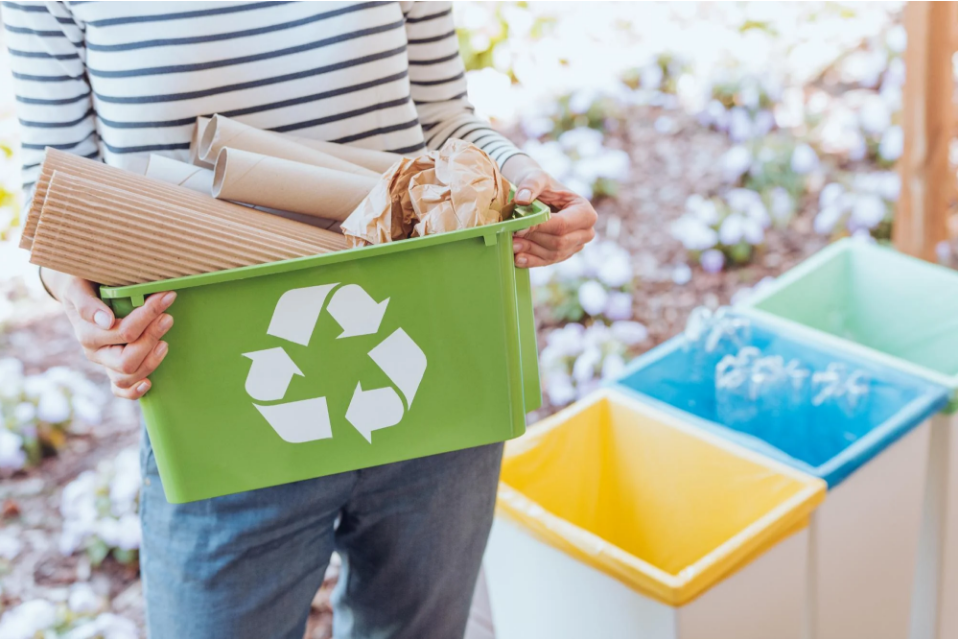
Strategic Positioning Through Material Choice
Vegan leather also supports compliance and reputation management. With growing global regulations against animal testing and stricter rules on animal-derived products, forward-thinking brands are choosing alternatives that anticipate legal and cultural shifts.
In the European Union and several US states, legislative action continues to move in favor of animal-free and sustainable materials. Brands that adapt now are not only ahead of regulations—they're aligned with future consumer expectations.
Certifications such as USDA Biobased, FSC (for backing fabrics), and PETA-Approved Vegan help strengthen a brand's ESG credibility and make procurement simpler for values-led buyers. For companies selling through retailers with sustainability scorecards, this foresight can open doors.
The Role of Vegan Leather in Brand Storytelling
Every material tells a story. When a beauty brand selects vegan leather for its holiday gift set or a launch kit, it creates a narrative of responsibility, innovation, and elegance. This resonates with:
- Retail buyers seeking values-aligned products
- Corporate clients curating high-impact, low-footprint gifts
- End customers choosing brands that reflect their lifestyle
A thoughtfully designed cosmetic bag made from cactus or apple leather is not just packaging—it's a statement piece.
Storytelling doesn't stop at product launch. Through digital content, influencer partnerships, and in-store experiences, brands can extend the life of their vegan gifting campaigns. Social media unboxings, QR-code-based transparency trails, and behind-the-scenes footage of material sourcing offer compelling ways to deepen engagement.
Rivta's Approach: Collaboration, Customization, Certification
At Rivta, we are more than a supplier—we are a creative partner. Our core capabilities include:
- Design Collaboration: From sketches to samples, we co-develop products with your team.
- Material Consultation: We help you navigate the evolving world of vegan and recycled textiles.
- Full Customization: Tailored shapes, inserts, zippers, hardware, embossing, and more.
- Certifications: We hold BSCI, SEDEX, and ISO9001 certifications to ensure responsible production.
With over three decades of experience, our production is not only efficient but also aligned with international standards for quality, safety, and ethics.
We've supported brands launching their first sustainable gifting lines and legacy players pivoting toward greener goals. Our sample library includes dozens of certified vegan leather types and alternative textiles, allowing you to test finishes before scaling up.
Certifications That Build Buyer Confidence
Procurement professionals need more than beautiful products—they need assurance. That's why Rivta maintains industry-leading certifications:
| Certification | What It Means | Benefit to Brands |
|---|---|---|
| BSCI | Ensures ethical labor and working conditions | Mitigates reputational risk |
| SEDEX | Enhances supply chain transparency | Supports responsible sourcing goals |
| ISO9001 | Quality management systems | Guarantees consistent production quality |
These credentials empower brands to speak confidently about the integrity of their gifting materials and supply chain.
Redefining Luxury with Purpose
The integration of vegan leather into luxury beauty gifting is not merely a design choice—it's a strategic move. It reflects a growing recognition that true luxury in the 21st century is defined by responsibility as much as aesthetics.
For beauty brands seeking to differentiate themselves in an increasingly crowded market, vegan leather offers:
- Material innovation
- Emotional resonance
- Regulatory alignment
- Environmental performance
- Strategic storytelling
The journey towards guilt-free glamour is well underway, with vegan leather standing as a testament to the beauty industry's capacity for innovation and its growing commitment to ethical and sustainable practices. The shift from traditional materials to advanced, bio-based alternatives is not merely a fleeting trend but a fundamental redefinition of luxury itself. Brands are recognizing that true distinction in today's market stems not only from exquisite craftsmanship and aesthetic appeal but also from a profound respect for the planet and its inhabitants.
The ability to customize these sustainable materials further empowers brands to create truly unique and memorable gifting experiences, reinforcing their identity and leaving a lasting impression. Partners like Rivta, with their extensive experience, commitment to eco-friendly solutions, and adherence to international certifications, play a pivotal role in transforming these visions into tangible realities. They bridge the gap between innovative materials and high-quality production, ensuring that luxury beauty brands can deliver on their promise of responsible glamour.
As we move forward, the future of luxury beauty will undoubtedly be characterized by a deeper integration of ethics, environmental responsibility, and cutting-edge technology. The demand for products that are both luxurious and conscientious will continue to grow, driving further innovation in materials and manufacturing processes. Guilt-free glamour is not just a concept: it is the new standard, inviting brands and consumers alike to embrace a future where beauty, ethics, and sustainability flourish in harmonious coexistence. Because in the new era of beauty, glamour doesn't come at the planet's expense—it elevates it.
Want to learn more about sustainable gifting options or request material samples? Contact our team at Rivta today and let's begin designing your next statement piece—one that reflects your brand's commitment to beauty with a conscience. Visit us at https://rivta-factory.com/.
